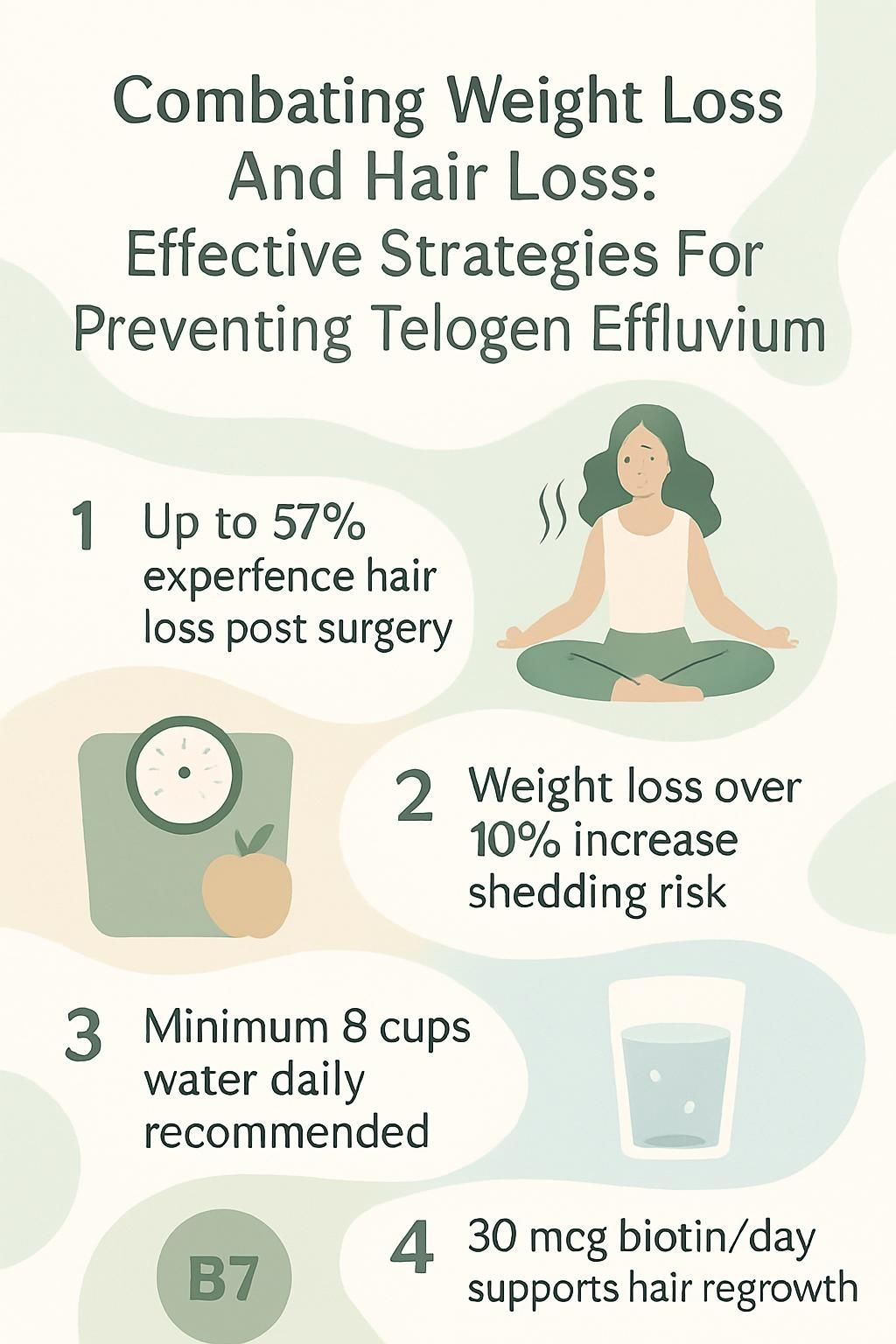Combating Weight Loss And Hair Loss: Effective Strategies For Preventing Telogen Effluvium
Our Nutrition Assistant AI Suite will transform your body. You will lose fat, get toned, and build muscle. Gain confidence and optimal health.
Noticing more strands in the shower after you start losing weight can feel scary. Rapid diet changes may trigger telogen effluvium, a temporary type of hair loss that disrupts the hair growth cycle. Understanding the link between weight loss and hair loss helps you protect your scalp and support regrowth.
This guide explains why shedding happens and shows you clear steps to prevent telogen effluvium. Use these strategies to keep your hair strong while you reach your weight goals.
Key Takeaways
- Fast weight loss and crash diets can trigger telogen effluvium. Up to 57% of gastric bypass patients report heavy shedding within three months [Jabbari et al., 2020].
- Nutritional gaps in protein, iron, zinc, biotin, or vitamin D are common causes of hair loss during weight changes, especially after losing more than 10% of body weight.
- Balanced meals, steady protein intake, at least 8 cups of water daily, and avoiding crash diets lower the risk of shed linked to telogen effluvium.
- Helpful targets: biotin 30 mcg per day, iron 8 mg for men and 18 mg for women, plus zinc, vitamin D, and omega-3 fats to support regrowth.
- Manage stress with mindfulness, aim for 7 to 9 hours of sleep, and use gentle sulfate-free products to reduce extra shedding.

What is Telogen Effluvium?

Telogen effluvium is a common, short-term hair loss condition. It often follows stress, illness, or a major diet shift, and can make hair look thinner all over.
What is telogen effluvium and how does it affect hair?
Telogen effluvium happens when many follicles shift into the telogen, or resting, phase at once. Triggers include rapid weight loss, illness, surgery, or major life stress. Instead of patchy bald spots, shedding is diffuse across the scalp.
People often see extra hair in the shower or on the pillow. In some cases, up to 30% of hairs can shed. Both men and women can be affected, and the condition usually improves once the trigger is addressed.
“Many people find clumps of hair on their pillow or in the shower after starting a new diet,” says Dr. Jerry Shapiro, dermatologist and hair loss expert. Hair often regrows over several months after recovery and better nutrition.
How are weight loss and telogen effluvium connected?
Sudden calorie cuts, crash diets, or bariatric surgery can create nutrient shortfalls that stress follicles. When the body is under strain, more hairs shift from active growth to the telogen phase, which raises shedding.
Fast weight loss can reduce intake of protein, iron, zinc, biotin, and vitamin D. These nutrients fuel new hair production and scalp health. Shedding usually starts two to three months after the diet change.
During stress, your body protects vital organs first and delays nonessential tasks like hair growth. A loss of more than 10% of body weight increases risk. In one 2020 review, up to 57% of gastric bypass patients reported noticeable shedding due to malnutrition disrupting the growth cycle [1].
This link shows why steady weight loss and balanced meals are key if you want to prevent telogen effluvium.
[1] Jabbari A., et al., “Hair Loss After Bariatric Surgery: Review.” International Journal of Trichology, 2020.
Causes of Hair Loss During Weight Loss
Several factors can cause hair loss during weight loss. Knowing the drivers makes it easier to protect your strands and plan your diet.
How do nutritional deficiencies cause hair loss?
When calories or nutrients are low, your body prioritizes heart, brain, and other critical organs. Hair growth slows. Low levels of iron, zinc, biotin, protein, vitamin D, and vitamin A can disrupt the hair growth cycle.
Iron deficiency is especially common. One study found low iron in roughly 60% of women with hair loss. Very-low-calorie plans and restrictive diets raise the risk by limiting minerals and vitamins.
During my own weight loss, I saw extra strands on my pillow after losing weight too quickly. Blood tests showed low ferritin, the iron storage marker. A multivitamin and iron supplement, plus better meals, reduced shedding over several months.
Good news: hair often regrows if you fix the deficiency and keep your scalp care gentle.
Why does rapid weight loss lead to hair shedding?
Rapid weight loss shocks the system and disturbs the normal growth cycle. The body senses stress and pushes more follicles into the resting phase. Shedding rises several weeks later.
A 2020 report found up to 56% of people who lost a large amount of weight noted hair loss within three months. Poor intake of protein, zinc, biotin, and healthy fats also limits building blocks for strong hair.
Sudden calorie restriction limits critical micronutrients needed for healthy human hair growth.
Hormone shifts from severe dieting or surgery, including lower thyroid hormone, can thin and weaken strands. These changes often cause excess shedding after quick weight drops.
What hormonal changes affect hair loss during weight loss?
Eating far fewer calories can reduce estrogen and thyroid hormones. These changes interrupt the growth cycle and can trigger telogen effluvium. Stress also raises cortisol, which shortens the active growth phase.
Major diet shifts, surgery, or rapid muscle loss can raise shedding three to four months later. Stopping or changing birth control pills may add to the fluctuations and shedding.
After I lost 25 pounds, I noticed thinner density at my part line about three months later. My clinician checked my thyroid and advised iron and zinc rich foods. That support helped stabilize the shedding while my hormones adjusted.
How do physical and emotional stress contribute to hair loss?
Stress from strict diets, illness, or life events can push many follicles into a resting state. Shedding often shows up two to three months after the stressful event. Cortisol, the main stress hormone, disrupts the cycle.
Intense training plans, major calorie cuts, or big life changes can all add stress. I once lost ten pounds quickly before a school event and saw a wave of shedding two months later. Calmer routines and better self-care improved regrowth for me.
How Can You Recognize Telogen Effluvium Symptoms?
Spotting early signs helps you act faster. Look for a steady uptick in daily shedding and a general drop in volume.
What does diffuse hair shedding look like?
Diffuse shedding means hair falls evenly from all over the scalp. You might find more strands on your pillow, in the shower drain, or on your brush. The part may look wider, and your ponytail can feel smaller.
This pattern does not usually form bald patches. Many people shed 100 to 300 hairs daily for several weeks or months after a major weight change.
How can you identify thinning hair?
Thinning often shows as a wider part or more visible scalp under bright light. Individual hairs may look finer. You may notice more shed after washing or combing.
Watch the temples and crown, common early sites of thinning. My ponytail got smaller after weight loss surgery, which made styling harder and alerted me to increased shedding. Comparing photos month to month can help you track changes.
When does hair loss typically start after weight loss?
Shedding usually begins two to three months after a large weight drop. This timing matches the growth cycle, where stress moves many hairs into the resting phase. You might see more hair on your brush, pillow, or shower floor during this period.
Even with a decent diet, quick weight loss can raise shedding. I lost fifteen pounds fast for a fitness event and noticed thinning about ten weeks later, especially along my hairline. Most people see regrowth within six months if nutrition improves and weight loss slows down.
Effective Strategies to Prevent Hair Loss During Weight Loss
Preventing hair loss during weight changes requires steady habits. Focus on nutrition, hydration, and gentle routines that protect follicles.
How can adopting a balanced diet help prevent hair loss?
Balanced meals supply the building blocks for hair: protein, iron, zinc, and vitamins like biotin and folate. Iron helps red blood cells carry oxygen to follicles. Zinc supports repair and oil gland balance.
Helpful picks include eggs, fish, leafy greens, beans, and nuts. Restrictive or crash diets raise risk for diffuse shedding. With balanced nutrition, hair often regrows after a telogen effluvium episode.
Why is increasing protein intake important for hair health?
Hair is mostly keratin, a protein. If your meals lack protein, the body diverts it to vital organs. Follicles can go idle, which increases shedding during rapid weight loss.
Most adults need at least 0.8 grams of protein per kilogram of body weight each day. Choose eggs, poultry, fish, dairy, tofu, or legumes. Include a protein source at every meal to protect strands while you lose weight.
Which essential vitamins and supplements support hair growth?
Biotin, iron, zinc, and vitamin D support healthy hair. Biotin, or vitamin B7, backs keratin production. Iron moves oxygen to roots. Zinc aids repair. Vitamin D supports follicle activity. Omega-3 fats ease scalp inflammation.
Lysine and inositol may help some people during stressful times. Talk with a healthcare provider before starting supplements, since excessive doses can cause side effects or even worsen shedding.
How does staying hydrated reduce hair loss risk?
Water helps deliver nutrients and oxygen to follicles. Hydrated follicles function better and can grow stronger hair. Dry scalps and low fluid intake can add to thinning.
Aim for at least 8 cups of water daily, or follow medical guidance if you have a condition that affects your fluid needs. Good hydration supports your organs and your hair during a diet.
Why should you avoid crash diets or rapid weight loss?
Crash diets strip essential nutrients. A steep calorie drop disrupts metabolism and can trigger telogen effluvium a few months later. Reports suggest that losing more than 10% of body weight in three months often leads to noticeable shedding.
Severe plans also stress hormones and may cause fragile shafts. Many restrictive diets lack protein, vitamin D, and healthy fats that protect hair. A steady, balanced approach supports weight loss and reduces hair loss risk.
Recommended Vitamins and Nutrients for Healthy Hair
Several nutrients are central to hair growth. Use food first, then consider supplements with your clinician’s guidance.
How does biotin support hair health?
Biotin helps your body turn food into energy and supports keratin, the main hair protein. Low biotin can lead to thinning or breakage. Some people see stronger strands after correcting a deficiency.
During my weight loss, I added eggs and nuts, both rich in biotin. Shedding eased within two months. Adults generally need about 30 micrograms daily for normal function and hair support.
What role does iron play in preventing hair loss?
Iron supports hemoglobin, which carries oxygen to every organ, including the scalp. Low iron can lead to anemia and telogen effluvium. Women are at higher risk due to menstruation and restrictive diets.
Targets: 8 mg for men and 18 mg for women ages 19 to 50. Choose lean meats, beans, leafy greens, and fortified cereals. When I ate a vegetarian diet with poor planning, shedding increased until I corrected iron with help from my healthcare provider.
Why is zinc important for hair growth?
Zinc supports follicle function and protein building. Low zinc can trigger telogen effluvium and, in severe cases, anagen effluvium. Studies find lower average zinc in people with unexplained hair loss compared to controls.
Good sources include lean meats, legumes, seeds, and nuts. If you recently changed your diet for weight loss, track intake to prevent deficiency. Ask your clinician before using zinc supplements.
How can vitamin D deficiency affect hair loss?
Vitamin D supports follicle activity. Low levels can push hairs into a resting state, which leads to diffuse shedding and slower regrowth. Research links low vitamin D with higher rates of hair loss, especially in younger women.
Your doctor may check your levels if shedding is unexplained. Foods and supplements can help correct low levels and support regrowth.
What benefits do omega-3 fatty acids provide for hair?
Omega-3 fats reduce scalp inflammation and help with moisture balance. In some studies, people taking omega-3 supplements for six months saw higher hair density than those who did not.
Fatty fish, walnuts, and flaxseed are useful sources. When I added more omega-3 rich foods during weight loss, daily shedding lessened within weeks.
| Nutrient | Role in Hair | Suggested Intake | Food Sources |
|---|---|---|---|
| Protein | Builds keratin and repairs tissue | 0.8 g/kg body weight daily | Eggs, fish, poultry, tofu, beans |
| Iron | Oxygen delivery to follicles | Men 8 mg, Women 18 mg | Lean meats, beans, spinach, cereal |
| Zinc | Follicle function and repair | Women 8 mg, Men 11 mg | Meat, legumes, seeds, nuts |
| Vitamin D | Follicle activation | As advised by clinician | Fortified dairy, eggs, sunlight |
| Biotin | Keratin support | 30 mcg | Eggs, nuts, seeds |
| Omega-3 | Scalp hydration, anti-inflammatory | 1 to 2 servings fish weekly | Salmon, sardines, walnuts, flaxseed |
Hair Care Tips During Weight Loss
Gentle habits protect fragile strands. Small changes to products and styling can reduce breakage and shedding.
Which gentle hair care products are best during weight loss?
Choose sulfate-free shampoos and conditioners to avoid stripping natural oils. Look for soothing ingredients such as aloe, coconut oil, or argan oil. Labels that say gentle or for sensitive scalp are often good options.
Pick lightweight leave-in products rather than heavy creams. A wide-tooth comb limits tugging. Avoid harsh chemicals in dyes or straighteners while your hair is under stress.
Why avoid heat styling and harsh treatments on hair?
Flat irons and curling wands can damage the hair’s outer layer. High heat removes moisture and weakens fibers, which leads to breakage and a thinner look. Chemical treatments can add irritation when your body is already stressed from dieting.
Heat above 300°F causes protein loss in hair fibers. Skip harsh treatments during this period. Air dry, use low heat if needed, and brush gently to support recovery.
How to hydrate and moisturize your scalp effectively?
Use a sulfate-free shampoo and lukewarm water, since hot water can dry the scalp. Massage a few drops of argan or jojoba oil into the scalp once or twice a week to support circulation.
Drink about 64 ounces of water daily. Omega-3 fats in salmon or walnuts help maintain scalp moisture. In dry rooms, a humidifier can reduce itching and flaking.
How can you protect your hair during workouts?
Soft headbands or sweat-wicking caps reduce friction at the hairline. Wear loose braids or buns instead of tight ponytails to avoid traction on follicles.
I switched from tight elastics to silk scrunchies during workouts and saw less shedding in two weeks. Rinse out sweat with a gentle shampoo after intense sessions to keep follicles clear.
Stress Management Techniques to Prevent Hair Loss
Stress control is a core part of hair care. Calming your nervous system can steady the growth cycle.
How does mindfulness or meditation reduce hair loss?
Meditation lowers cortisol, the main stress hormone. High cortisol can push follicles into the telogen phase, which increases shedding. Short daily sessions, even ten minutes, can help during weight loss or recovery after surgery.
Breathing drills, body scans, or guided imagery are easy entry points. I set aside five minutes each morning for breathing practice, and the amount collecting in my drain dropped over time.
Better stress control also improves sleep quality, which supports growth. That leads into the next key habit, consistent sleep.
Why is getting sufficient sleep crucial for hair health?
Deep sleep supports hormone balance and cell repair. Growth hormone pulses at night and helps follicles. Less than seven hours of sleep can raise cortisol and increase inflammation, which affects the growth cycle.
In a 2017 study from the University of Tsukuba, mice with disrupted sleep lost more hair than those with steady sleep. After I improved my sleep routine, my hair felt stronger within two months.
How does regular physical activity help prevent hair loss?
Exercise improves blood flow, which carries nutrients to follicles. It also lowers stress hormones linked with shedding during weight loss.
Daily walks and light strength work reduced my shedding across several months. Consistent activity helps maintain a steady nutrient balance for healthy strands.
When should you seek support from friends or professionals?
Reach out if worry or sadness about hair loss starts to affect your day. Friends can offer perspective and encouragement. If distress continues, a therapist can teach coping skills.
See a clinician if shedding worsens despite changes to your diet and stress habits. Hair loss that lasts beyond six months may point to an underlying condition. Group support helped me follow treatment plans without feeling alone.
When to Consult a Doctor
Some patterns of shedding need medical review. A licensed clinician can check for hidden causes and suggest targeted care. This article is for education only and does not replace medical advice.
When is hair loss considered persistent or severe?
Loss is persistent if it continues longer than six months. It is severe if you lose more than 100 hairs per day or see visible thinning in patches or all over.
Clumps in the shower, bald areas, or a sudden change after surgery or a strict diet are all warning signs. Early evaluation helps protect remaining hair and guides effective treatment.
What are the signs of underlying health conditions causing hair loss?
Patchy loss, bald spots, severe itching, redness, or scaling can signal thyroid disease, iron deficiency, or autoimmune problems. Fatigue, unplanned weight changes, or nail changes may appear as well.
I worked with someone who started rapid weight loss and noticed heavy shedding. Tests showed low thyroid hormone. Treating the condition slowed the loss and improved regrowth.
What medical treatments are available for telogen effluvium?
Clinicians often start with blood tests to look for iron deficiency, thyroid issues, and low vitamin D. If a deficiency is found, they may recommend iron or a multivitamin. After my weight loss surgery, lab work led my doctor to add iron and biotin.
If shedding continues after fixing nutrition and reducing stress, topical minoxidil may help. In tougher cases, dermatology specialists may use corticosteroid creams or in-office scalp therapies.
Treatment Options for Telogen Effluvium
Several treatments can support regrowth while your body recovers. Choose options that fit your lifestyle and medical history.
How do topical treatments like minoxidil work?
Minoxidil widens blood vessels in the scalp. Better flow brings oxygen and nutrients to follicles, which can shorten the resting phase and restart growth sooner.
Many people see improvement within three to six months. I noticed less shedding after two months of consistent use during a period of rapid weight loss.
What is low-level laser therapy and how effective is it?
Low-level laser therapy, also called cold laser or red light therapy, uses specific light wavelengths to stimulate follicles. Caps, combs, or helmets are used for a few minutes several times per week.
Studies from 2014 and 2017 show gains in hair count and thickness in people with telogen effluvium or pattern loss. Results can appear after 12 to 24 weeks. I used a laser cap after weight loss surgery, and density looked better after four months.
Can hair growth supplements help treat telogen effluvium?
Supplements can help if you have a documented deficiency. Biotin, zinc, iron, and vitamin D are the most common gaps. Correcting low levels often improves shedding within three to six months.
Supplements alone will not fix hair loss from stress, hormones, or surgery. Work with your clinician to address root causes, and avoid high doses without guidance.
What specialized scalp treatments are recommended?
Platelet-rich plasma, or PRP, uses your own blood to concentrate growth factors that are then injected into the scalp. Some studies report up to a 30% rise in density after three sessions over six months.
Microneedling creates tiny channels that help topical treatments like minoxidil reach follicles. Medicated shampoos with ketoconazole, caffeine, or saw palmetto may reduce inflammation. Gentle scalp massages with coconut or rosemary oil can support blood flow.
If you have surgery related hair loss or ongoing concerns, consult a board-certified dermatologist to plan the safest approach.
Myths and Misconceptions About Weight Loss and Hair Loss
Misinformation spreads fast during weight loss. Knowing the facts helps you set realistic expectations and choose smart steps.
Is hair loss permanent after weight loss?
Hair loss from telogen effluvium is usually temporary. Follicles stay alive, and regrowth often begins within three to six months after you improve nutrition and reduce stress.
After I lost weight quickly, adding protein and iron slowed shedding within a few months. If thinning lasts more than a year or appears in patches, see a clinician for further testing.
Can supplements alone stop hair loss?
Supplements can fill gaps, but they are only part of the plan. Telogen effluvium usually has several triggers, including stress, hormones, and nutrient shortfalls.
Best results come from a combined approach: balanced meals, steady protein, stress control, and slow, sustainable weight loss.
Does weight loss always cause hair loss?
No. Many people lose weight without major shedding. Slow, steady loss with enough protein, iron, and vitamins reduces risk.
One study in the Journal of Clinical Endocrinology & Metabolism found about 30% of people who lost more than 15% of body weight reported shedding. Crash diets, skipped meals, and high stress raise that risk. Balanced plans lower it.
Conclusion
Preventing hair loss during weight loss is possible with smart habits. Focus on balanced nutrition with enough protein, iron, zinc, biotin, vitamin D, and healthy fats. Drink water, manage stress, and use gentle hair care.
Choose slow, steady progress instead of rapid weight loss to protect your hair growth cycle. If shedding is severe or ongoing, speak with a healthcare professional. With the right plan, you can reach your goals and support healthy hair at the same time.
FAQs
1. What is telogen effluvium and how does it relate to weight loss?
Telogen effluvium is a temporary hair shedding condition that often follows physical or emotional stress. Rapid weight reduction, especially from strict diets or nutrient deficiencies, can trigger this type of hair loss by disrupting the normal growth cycle.
2. Which nutrients are most important for preventing hair loss during weight management?
Key nutrients include protein, iron, zinc, vitamin D, and biotin. Studies show that low levels of these nutrients may increase the risk of telogen effluvium in people who lose body mass quickly (Almohanna et al., 2019).
3. How can someone prevent telogen effluvium while trying to reduce body fat?
Gradual changes in eating habits help maintain balanced nutrition and support healthy follicles. A registered dietitian can create a meal plan rich in essential vitamins and minerals to lower the chance of excessive shedding.
4. Can personal experience with rapid slimming lead to noticeable thinning?
Yes; many individuals report increased strand loss after sudden calorie restriction or crash dieting. For example, one patient noticed more scalp visibility within two months after starting an extreme regimen but saw improvement once she restored her nutritional intake.
Summary: Telogen effluvium often results from quick reductions in calories or missing key dietary elements like protein and iron during attempts at losing excess pounds. Evidence suggests slow adjustments paired with proper nutrition protect against unwanted thinning while supporting overall health (Harvard Health Publishing).







